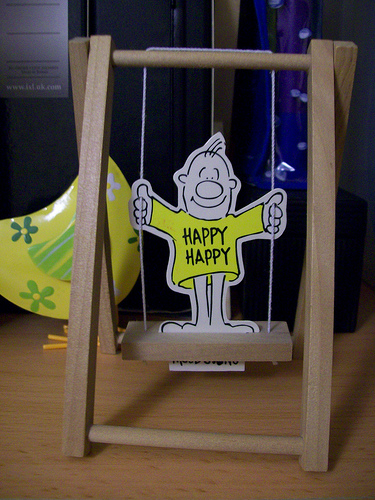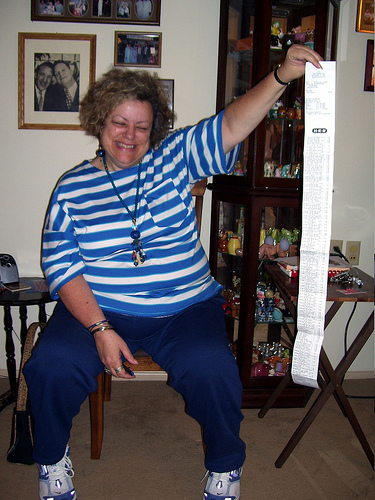Helping a Friend with Bipolar Mood Disorder
Bipolar disorder is a mood disorder, but people can suffer with various types and with different levels of severity. Some people may have very long periods between mood changes, whilst others may be unfortunate to suffer from a rapid cycling change of mood. Then there are those who suffer somewhere in between.
The moods commonly associated with bipolar disorder (manic depression), are depression and mania. Depression is pretty much self explanatory, but there can be different levels encountered, ranging from mild to very severe. The same can be said of mania or the manic phase. People can suffer with periods of increased activity and elation known as hypomania but this does not interfere with life quite so much, whereas there are those who have severe manic episodes causing much disruption. There is even a mild form of the disorder known as cyclothymia.

Alongside feeling depressed or manic, a sufferer can also become psychotic and experience paranoia, delusions, or hallucinations.
I have had two friends for many years who both suffer with bipolar disorder. One of them suffers much more with the depression and psychosis. Her mania phases are far and few between and are hypomanic. My other friend has rapid cycling bipolar where her mood changes are severe and occur every three or four weeks. She too has psychotic episodes. They both suffer with intense anxiety problems at times. Over the years I have got to know their moods and behaviors very well, and as a friend, how I can be helpful in their time of need.
If you have a friend who has bipolar mood disorder, I am sure you will sometimes get frustrated as I did in the early days. This can be a very testing illness for both patient and those who are closest to them.
Behavior Changes in Bipolar Disorder
The following are the behavior changes I see in both of my friends.
Depression
- Lethargic with an intense feeling of slowing down
- Feel a need to sleep a lot more
- Feel disinterest in usual activities
- Unable to concentrate
- Irritable
- Anxious and fearful
- Have little appetite
- Forgetful
- Have dark or suicidal thoughts
- Have an utter sense of hopelessness
- Self-isolated
Types of Bipolar Disorder
For my friends, the onset of these feelings is fairly rapid. From the initial gut feelings to the full blown symptoms, it may take just two or three days. The psychotic symptoms may take a little longer to manifest.
Mania or Manic Episode
- Elevated mood – almost euphoric at times
- Talking fast and sometimes incessantly
- Extremely active
- Little need for sleep
- Distracted easily
- Very enthusiastic and over-confident about goals and ideas
- Tendency to spend more and go on shopping sprees
- Make rash decisions – impulsive
- Prone to temper flare ups
There is a distinct difference between my two friends in the manic phase. One friend’s symptoms of mania are only just noticeable. The other is at the high end of the scale. There are variations in how long these episodes last. Both get severely depressed and this can change their lives dramatically. Many people with this illness have suicidal thoughts or actually attempt suicide.
What Depression Feels Like
Examples of Behavior in Depression
I know when my friends are depressed as both tend to stop phoning me. This sudden lack of communication alerts me to contact them. Self-imposed isolation is characteristic with depression.
Talking to both of them can become a little strained as they really do not feel like making conversation. On one occasion I phoned my friend and she could only reply with a yes or no. In between there were long silences, such was the lack of enthusiasm and energy.
When the depression is at its worst, both tend to take to their beds, only getting up to eat occasionally or wash. They 'manage' their depression this way and it feels right for them, so I accept that readily. When they have to live with such low-lows, they have learned how best to survive the episodes.
Both get psychotic symptoms with their depressive episodes, and this is the most challenging aspect for me as a friend. One has a recurrent feeling of being spied on and refuses to answer the phone as she believes it is tapped. She sees crawling insects in her bed too. The other has similar paranoid delusions about being watched and is too fearful to go to the shop down the road. They both try to cope with the psychosis by performing safety behaviors and rituals
Symptoms of a Manic Episode
Examples of Manic Behavior
All sense of time seems to disappear for one of my friends. Night becomes day, and it is not unusual for her to stay awake for two or three days at a time. I get many more phone calls from her when she is having an episode of mania.
This is the time when she tends to overspend, lends out money with little thought and goes on wild shopping sprees. Her impulsive behavior has caused her to get into debt and she has even had to have items returned to the shop because she can not afford the payments.
My friend is intelligent, quite creative, and when manic she tends to want to write a book. Within days she has written a hundred pages, some of it quite unintelligible because she has written so fast. Her exuberance is almost infectious and the ideas that fly freely into her head are pursued with an utter confidence I don't usually see in her.
Because she is single, it is in her manic phase that she feels the confidence to consider and act upon looking for a partner. Sadly, some of the rush attempts at a relationship and the impulsive decision making has led to heartache on both sides.
Helping a Friend with an Episode of Depression
It is heartbreaking to watch a person you care about sinking very quickly into despair time and time again. This can be a very dangerous time for someone with bipolar disorder and suicides do occur.
Here is how I try to help my friends when they are falling into that black hole.
I believe communication should be important to anyone who is depressed, as it always tends to feel worse when you are alone with your thoughts. Even though the sufferer may not feel up to talking much, making contact can be reassuring to them and give them a chance to share how they feel. Even if they don’t want to share their feelings, I try to keep the conversation positive and upbeat. I remind them that this phase will pass as it has done before so many times. They tell me they get comfort from this. Try to perfect the art of listening too and not be too pushy as a depressed person is easily overwhelmed.
Practical Guides for Friends with Bipolar Disorder
Staying in touch is also important because your friend may be having suicidal thoughts, and as a friend you need to know if there is a good chance they may harm themselves. Even though both of them have a fear of ending up in a psychiatric ward, I wouldn’t hesitate to ring their workers or the local hospital if I feared for their lives.
Quality of life at these times can be extremely poor, so I try to give them hope by suggesting baby steps to tackle everyday tasks. If you can get them even a tiny bit motivated it’s better than them lying in bed all day every day. Expect little and praise highly if any of your suggestions are carried out. They may be worrying about the housework or some other duties they feel unable to perform. Again, keep reminding them that this will pass, and suggest they try to do a little every day but not burden themselves with worry over it.
Encourage them to eat, even if it’s just a bowl of soup or a few biscuits. It is highly likely that they are taking medications, and it is not ideal to take these on an empty stomach.
Self-esteem and hope is sorely lacking when very depressed. Remind them of their good qualities and their abilities.
I used to try to rationalize with my friends when they were seeing things, hearing things or getting paranoid. I spent many hours on the phone telling them that the insects weren't really there or that no one was tapping the phone. It simply didn't work. I now tell them that I am there for them whenever they feel afraid, without getting into long conversations about their unreality. I increase my phone calls at these times to offer reassurance.

Helping a Friend with a Manic Episode
A phase of mania can be very challenging for those around a person with bipolar disorder. It can be almost exhausting to watch at times! Keeping in contact with your friend is just as important during this phase as with the depressive period. You are not responsible however, for any mistakes made by the characteristic poor judgment of a friend’s mood disorder, so you should never beat yourself up about it.
My friends don’t tend to need me so much when they are going through an episode of mania. I hear of a sudden new wardrobe of clothes or a much more expensive purchase and I have learned to simply wait until there is a normal period to talk about it. I gently discourage if I am asked my opinion, but if not, I wait.
They may actually forget you from time to time because they are so busy. This can be the nature of the disorder and no insult is intended.
Any creativity should be encouraged, even if you know it might not lead to anything in the long run. A creative pursuit that helps to burn off the excess energy can only be beneficial.
Encourage them to sleep or even take a nap if possible. They will be insistent that they have so much to do, but even a half an hour power nap is better than no sleep.
You have to remember that your friend loves this period of intensity, creativity and the platform to express incessantly. I learned to value it with them. The depression that follows is so deeply saddening, that I can understand why they adore a manic episode so much.
Workbooks for Bipolar Disorder
Picking up the Pieces
During the periods when my friends are experiencing some “normality”, I spend some time discussing how they can better manage the problems they face during each different phase. We make “to do” lists for both the depression and mania. One of them was having a problem deciding on which colored clothes should be put together in the washing machine when she got deeply depressed. This brought so much confusion and worry that she stopped washing clothes completely at those times. I suggested she bought different colored laundry bins for mixed colors, white and black clothes. When she is well or her mood is elevated, she now puts her clothes in the appropriate bins. Problem solved!
Tell your friend about your observations tactfully if you are worried about them, as they may not notice sometimes when their behavior is causing them further problems.
Support them through their relationship problems, and accept that poor judgment is often part of the illness. You need to practice great patience, but at the same time know in your heart that you are helping them to be as practical, sensible and safe as possible.










